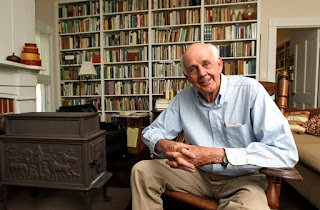How often does a person not only get to meet their hero, but also to visit with her or him in her/his home for two hours? That is exactly what happened to me yesterday (Sunday, February 5, 2018) when my son Isaac and I travelled to Wendell Berry's farm outside Port Royal, Kentucky, and visited with 83-year-old Wendell and his wife Tanya.
For those of you who have never heard of Wendell Berry, Wikipedia describes him as an American novelist, poet, environmental activist, cultural critic. According to the description in Amazon books, Berry's 1977 book, The Unsettling of America, "has been recognized as a classic of American letters. In it, Wendell Berry argues that good farming is a cultural and spiritual discipline. Today's agribusiness, however, takes farming out of its cultural context and away from families. As a result, we as a nation are more estranged from the land--from the intimate knowledge, love and care of it." Berry is the author of many works of fiction, poetry, and non-fiction essays and received the National Humanities Medal in 2010 and membership in the American Academy of Arts and Sciences in 2013. He is arguably America's most important cultural critic and often described as our modern-day Thoreau.
I first began reading Berry's essays in the early 1980s while in graduate school and was touched by his insistence that caring for the land and for our neighbors is connected. Giving up a high-profile position as a college professor at one of the nation's most prestigious universities early in his adult career, Berry moved back to his family land in rural Kentucky where he and Tanya raised their two children, and where he has practiced sustainable agriculture ever since. There he raises sheep and uses draft horses to work the land. And he writes and writes. Everything Berry does involves caring for creation and for his neighbors. To me, Wendell Berry has lived out his vision of a good life, one lived in harmony with the land, with his neighbors, and in the place where he grew up. His example influenced my decision to come back home to be head of school here instead of pursuing other jobs elsewhere.
Here is how I came to visit him. My son Isaac, who is an administrator at Christ School near Asheville, has a colleague who is a close friend of a close friend of Wendell Berry. Somehow, Isaac parlayed that relationship into an invitation from Wendell Berry to come visit him. We drove up to Lexington, Kentucky, on Saturday, spent the night, and drove to the Berry farm yesterday afternoon for our 3pm appointment. Berry's modest white farmhouse sits on a hill less than 100 yards above the Kentucky River, which is about the size of the Catawba with big hills on each side. There are lots of sheep on his hillside pastures and also a fair number of large solar panels, which reflect his commitment to clean energy.
What was my hero like? He was warm, funny, an incredible story teller, laughed easily at himself, a good listener, and, at times, profoundly moving. We covered a lot of territory in our conversation over two hours, helped in part by the fact that I have read everything he has ever written and adopted a lot of his thoughts and beliefs as my own.
Here are moments I will never forget from our conversation. Wendell Berry talking to my son Isaac about difficult years he spent at a military boarding school. He mentioned that he never told his parents about how hard and unpleasant it was there. Isaac--in the most forthright and disarming way--asked him why he never told them. Berry's response was unbelievably moving and honest as he spoke with great feeling of wanting to shield his parents and, especially, his mother from all knowledge of the brutality of military school.
 |
| Wiley Cash |
intends to read his books. I was thrilled to make the connection and proud to tell Berry about Cash.
After about an hour, I asked Wendell--he insisted I call him by his first name--if we should be leaving. He said, "No. I am enjoying your visit. It is not making me tired at all. Stay longer." So we spent another hour in the most delightful company. When Isaac and I left, we looked at each other and wondered if our visit really had happened or was it all just a really marvelous dream.
Thank you, Wendell, for your warm hospitality and for your profound influence of my life and thought. I will never forget the opportunity for Isaac and me to sit with you and Tanya and talk about things that matter.
